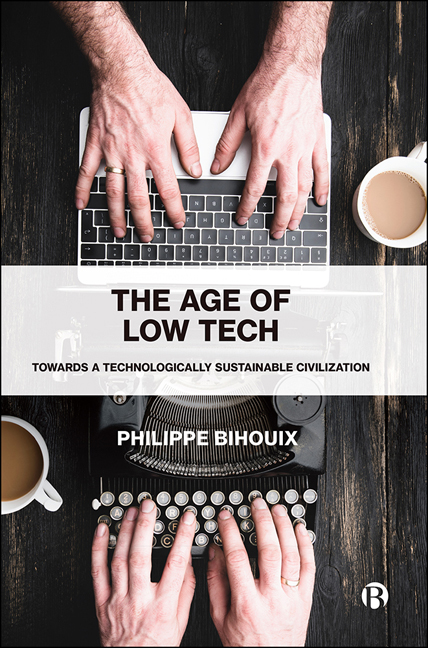Book contents
- Frontmatter
- Contents
- List of Figures and Tables
- Acknowledgements
- Preface to the English Edition
- Prologue: The Mad Dance of the Shrimps
- Part I The Rise and Fall of ‘Engineering Miracle-Workers’
- Part II The Principles of Simple Technologies
- Part III Daily Life in the Era of Simple Technologies
- Part IV Is ‘Transition’ Possible?
- Epilogue: A Dream If Ever There Was One
- Notes
- Index
Part I - The Rise and Fall of ‘Engineering Miracle-Workers’
Published online by Cambridge University Press: 19 March 2021
- Frontmatter
- Contents
- List of Figures and Tables
- Acknowledgements
- Preface to the English Edition
- Prologue: The Mad Dance of the Shrimps
- Part I The Rise and Fall of ‘Engineering Miracle-Workers’
- Part II The Principles of Simple Technologies
- Part III Daily Life in the Era of Simple Technologies
- Part IV Is ‘Transition’ Possible?
- Epilogue: A Dream If Ever There Was One
- Notes
- Index
Summary
Innovation, we are told: research and development, green growth, hightech and of course clean and resource-efficient products: these are the answers to all ills of the planet and of our societies as we search for a new lease of life. Sleep well, good people, because in our leading companies and ultra-modern laboratories painstaking researchers and engineers in white coats work and invent for you. We research, and, because we research, we will find, because we always have, haven't we?
Are we not finding oil and gas ever deeper under the oceans, not to mention by fracking which of course will be exploited in an ecological way? Breakthroughs in ‘clean’ cars and ‘green’ technologies are imminent. According to the most optimistic among us, we are at the dawn of a third or fourth industrial revolution. Thanks to smart grids, and intelligent energy and transportation networks (built on a model similar to the internet), we will all become producers and storage providers of green electricity. We will move to a hydrogen economy, to a circular economy that will recycle its wastes thus making available new resources; a future based on ever more mobility and connectivity …
Thus, at the risk of provoking a certain cognitive dissonance in the attentive reader, listener or viewer, we find that dire observations in the serious media concerning the state of the planet alternate with grand announcements of new technological breakthroughs, inventions, pilot projects and amazing start-up companies. We hear of freight-carrying airships and solar aircraft, of offshore wind turbines and solar plants in the desert, of wave and tidal power. Solar buildings will produce more energy than they use, ‘air purifying’ paints will clean up your indoor air. And that is not to mention the pages of discussions about ‘green consumption’ or the ‘sustainable economy’ that hardly consider the real environmental impact of the products on view: for example a mobile phone in a bamboo case or a low-consumption headlamp with integrated dynamo specially for ‘eco trekking’.
As the planetary indicators show, the present reality, the truth is that the world has never been so polluted and pillaged, even if, compared to the 19th century, there have been local improvements regarding some pollutants and industrial wastes.
- Type
- Chapter
- Information
- The Age of Low TechTowards a Technologically Sustainable Civilization, pp. 1 - 48Publisher: Bristol University PressPrint publication year: 2020



